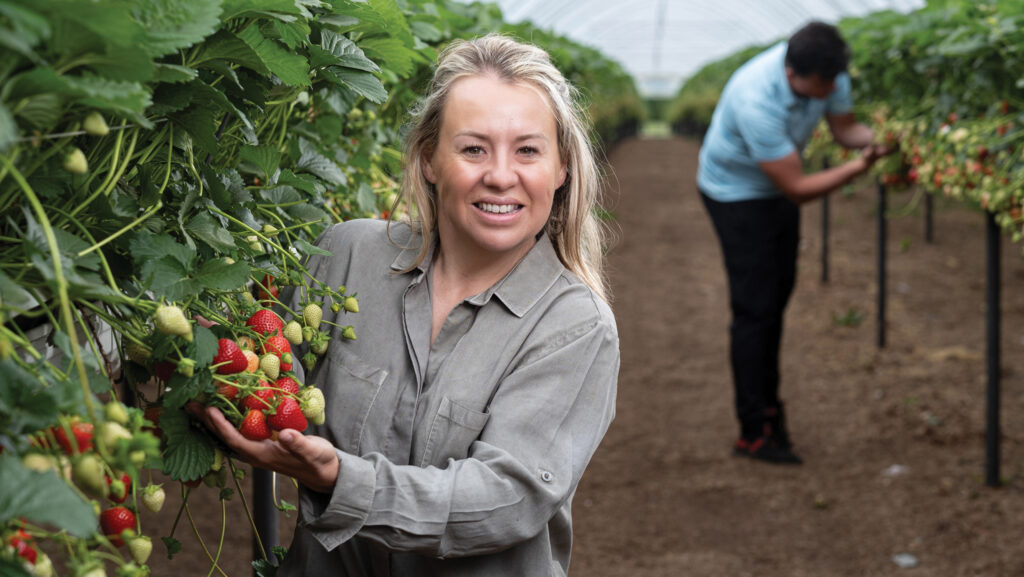Fruit grower turns waste products into business venture
 Annabel Makin-Jones © Jim Varney
Annabel Makin-Jones © Jim Varney Farmers Weekly‘s 2024 Diversification Farmer of the Year winner, Annabel Makin-Jones, has built a sustainable business model, which maximises the use of by-products to reduce costs and waste.
The Yorkshire-based fruit grower’s 160ha farm, based near Micklefield, Yorkshire, has 32ha of strawberry plants in polytunnels, which produce 2,000t of fruit each year.
During the growing season, strawberries are picked each day to be sold at retail and under the premium Annabel’s Deliciously British strawberries range.
See also: Why Barnsgrove is a farm diversification with a difference
Farm facts
- 2,000t volume of strawberries grown annually
- 350 staff on-site during peak season
- 79,000 trees planted on the farm in the past 30 years
- 32ha of strawberries grown on farm
- 3 million bees on farm
Any strawberries that fall out of specification are kept and used in a large range of other products including branded jams, chutneys, and Tame & Wild drinks.
Annabel also works with other distributors to create fruit-flavoured gins, vodkas and yoghurts.
Any remaining waste from the strawberry plants goes to power a local anaerobic digester, which is operated by the packaging supplier.
“We are always trying to make ourselves more streamlined and more efficient, using better varieties, better working practices, and better processes,” says Annabel.
The business trialled growing a raspberry crop on a larger scale for the first time last year, and has plans to refine this process further this year.
“It does take a few years to master and really know what you’re doing with it.
“The spacing between the plants, how we pick them, the height they get to, those type of things, there’s a lot more behind the scenes and you need that experience.
“You can’t just transfer all those skills from strawberries into raspberries, it’s a very different ballgame.”
Staffing
Roughly 350 staff are employed on-site during the summer months. This is made up of predominantly seasonal workers, along with 40 full-time staff and 15 in the office.
As a large employer, increased wages and higher national insurance (NI) contributions, which were introduced in April 2025, have had a major impact on the business.
The business has had to fork out hundreds of thousands of pounds in NI contributions alone as a result.
Annabel says the current economic climate has damaged business confidence.
“I have taken stock and almost sat still. That doesn’t mean we are not ambitious anymore, but we are in such a fragile environment, there are so many unknowns.”
“What it is really making me do is focus more internally on what we can do, rather than be ambitious and invest in new infrastructure.”
Cyclical business
A sustainable water management plan has been introduced to meet the high water requirement for strawberries.
Throughout the growing season, strawberry plants are provided with water using a hydroponic system.
This system uses water from a borehole, which is then stored in irrigation lakes on-farm.
“All water consumed is from off-grid supply, with rain water being captured and stored in our on-site lake and borehole water extracted from our own resource,” says Annabel.
Roughly 30% of the business’s total energy usage is provided by on-site solar panels with further plans to increase this to make the site fully reliant on renewable energy.
Bees were initially introduced to pollinate the strawberries.
This has since been expanded into its own venture with 22 colonies of bees now located on farm.
Sheets of honeycomb and jars of honey are sold as part of the Annabel’s brand.
Pesticide usage has been reduced through biological pest control using certain insects.
The farm has gained Leaf, British Retail Consortium, and Red Tractor accreditations and became B-Corp certified in 2023.
The 2025 Farmers Weekly Awards
The 2025 Farmers Weekly Diversification Farmer of the Year category is still open for entries.
Enter yourself or nominate at fwi.co.uk/awards25
